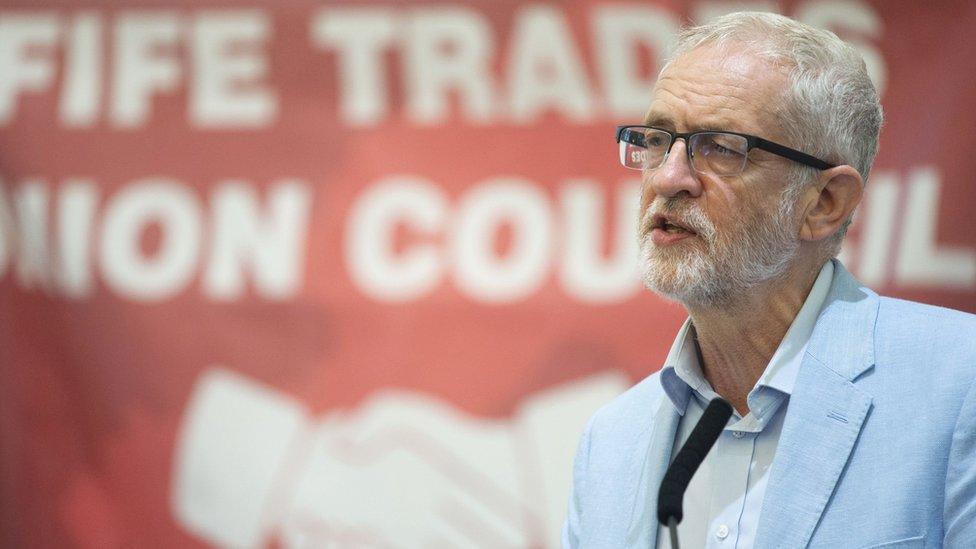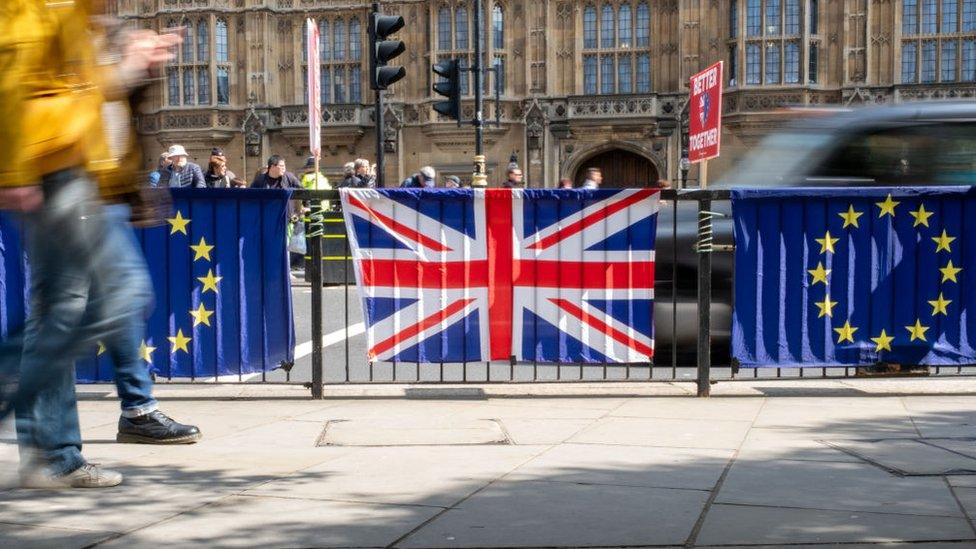Labour Brexit splits: Welsh Labour leader confirms he will back remain
- Published

Mark Drakeford has taken a different view on Brexit to Jeremy Corbyn
The leader of Welsh Labour, Mark Drakeford, has written to party members confirming that Welsh Labour will campaign to remain if there is another referendum on Brexit.
The first minister's comments came after UK Labour leader Jeremy Corbyn said he would seek a "sensible" Brexit deal if elected, before calling a vote.
But Mr Drakeford said "any type of Brexit... will cause potentially irreparable damage".
Labour's conference begins on Saturday.
The email came after Mr Drakeford was undermined at a key Labour body, where a request for control to be devolved over how MPs are reselected was rejected.
On Wednesday Mr Corbyn refused to say which side he might back in a referendum.
The Labour leader confirmed his party would go into the next election promising to negotiate a new Brexit deal and then to put that to the electorate in a referendum - along with an option to remain.
Mr Corbyn appeared to have left open the option that he might not back either side in that referendum. He said he believed the people should have the final decision.

Jeremy Corbyn said he would seek a "sensible" Brexit deal
Mr Drakeford had come under intense pressure within Welsh Labour to back remain, whatever the circumstances, after the party's historically poor performance in the European Parliament election in May.
In his letter to members he says: "We campaigned for a remain vote in the 2016 referendum and nothing we have seen or learned in the three years' since has changed our minds.
"Any type of Brexit - even the softest possible - will cause potentially irreparable damage to Wales and its economy. This is because Wales is heavily dependent on manufacturing and agri-food and 60% of our exports go straight to the EU."
"Labour has made an unequivocal commitment to put the Brexit decision back to the people.
"In that referendum, we, as Welsh Labour, must and will campaign to remain in the EU."
Mr Drakeford told BBC Wales that it was "not intended" to be a challenge to Jeremy Corbyn ahead of this weekend's party conference.
He said: "We are in government and we have a right to let people know what damage Brexit will do."
'Deeply disappointed'
Meanwhile Mr Drakeford has failed to persuade UK Labour's ruling body, the National Executive Committee, to devolve control of the reselection of Welsh Labour MPs to the Welsh party's governing body.
Mr Drakeford told MPs he was "deeply disappointed" by the outcome of Tuesday's meeting and that he will discuss "what action we can take to secure this devolution of powers... in the future."

Currently the rules are inconsistent across the assembly and Westminster. To replace an MP a third of his or her relevant local branches need to ask for a reselection in a trigger ballot. For AMs it is tougher to do so, with a majority needed.
Mr Drakeford's was substantially defeated at the committee, according to one source. Mick Antoniw, the NEC representative for Welsh Labour, said there were five votes in favour.
"I think there's a lack of understanding of the fact that Labour's in government of only one part of the UK and that's in Wales and they should pay more attention to that," he said.
"But there were distractions," he said. "Conference is looming, there are 30 motions to consider and there's Brexit."
Explaining why the rules should change, he said: "The question is should Wales be able to set its own trigger ballot threshold or should it be the same across the board?
"Devolution means that there will be differences between Wales, Scotland and England and these matters in relation to Welsh MPs should be in the control of the Welsh Executive Committee."
A source close to the decision claimed it was not a case of a left-right split, but said disagreement was more about the principle of having different rules for Welsh MPs.
"Why treat a parliamentary candidate in Newport different from Bristol," the source asked.
Mr Drakeford denied he lacked influence and said he will look again at the issue.
One Labour AM says the attempt to gain control of the reselection of MPs was a sign of Mr Drakeford's commitment to the democratisation of Welsh Labour: "There is a need for clear red water regarding Brexit and the federalisation of the party."
Alun Davies, Labour AM for Blaenau Gwent and a former NEC member, claimed there "had been a series of calculated decisions taken in the knowledge of the impact it will have on the Welsh party."
- Published18 September 2019
